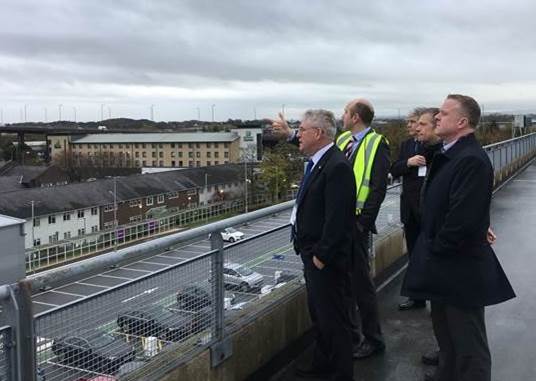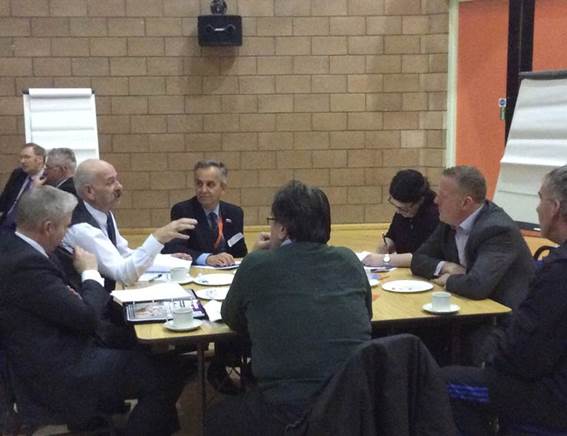Local Government and Communities Committee Annual Report 2017/2018
Introduction
This report covers the work of the Local Government and Communities Committee during the Parliamentary year from 12 May 2017 to 11 May 2018.
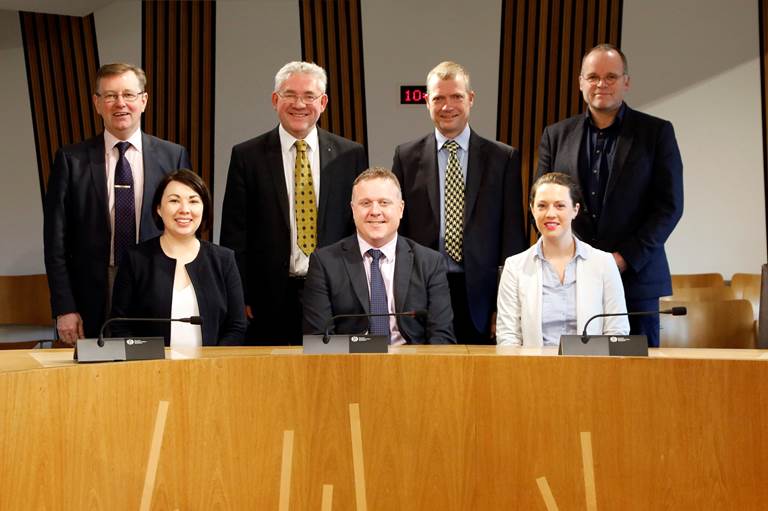
Membership Changes
Previous members of the Committee during the reporting year:
Elaine Smith (Lab) (8 June 2016 - 9 January 2018)
Meetings
During the parliamentary year, the Committee met 34 times. Of these meetings 2 were wholly in private and 32 were partly in private. Most items taken in private were the consideration of draft reports and consideration of evidence heard. All meetings were held in Edinburgh.
Equalities
The Committee mainstreams equalities issues throughout its work. It ensures that scrutiny can be undertaken on a meaningful basis particularly with those who are less likely to engage such as proactively seeking the views of disability groups and young people on the Planning (Scotland) Bill. The Committee also has included more deliberative methods of engagement within its scrutiny such as the recent community events on the Planning (Scotland) Bill. Both before and during these events the Committee provided information to those participating about the Bill and provided opportunities to ask questions and explore the Bill in more detail before their views were sought. This participative element then continued with the use of the online discussion tool Dialogue to enable the discussion to carry on after these events.
Since the start of the session, the Committee has made it a priority to ensure that often-excluded groups are able to inform the Committee's scrutiny proactively considering this at the start of every inquiry when planning its engagement work. For the Committee's inquiry into homelessness, the Committee ensured that it heard directly from those who had experienced homelessness initially to frame its inquiry and then later at Committee to inform its scrutiny of the Minister for Local Government and Housing. This evidence was vital to the Committee's final recommendations in its report entitled Report on Homelessness.
The Committee has proactively sought to ensure greater diversity in those who give evidence to it. Of the witnesses that gave evidence at Committee meetings during the Parliamentary year 117 have been men and 53 have been womeni.
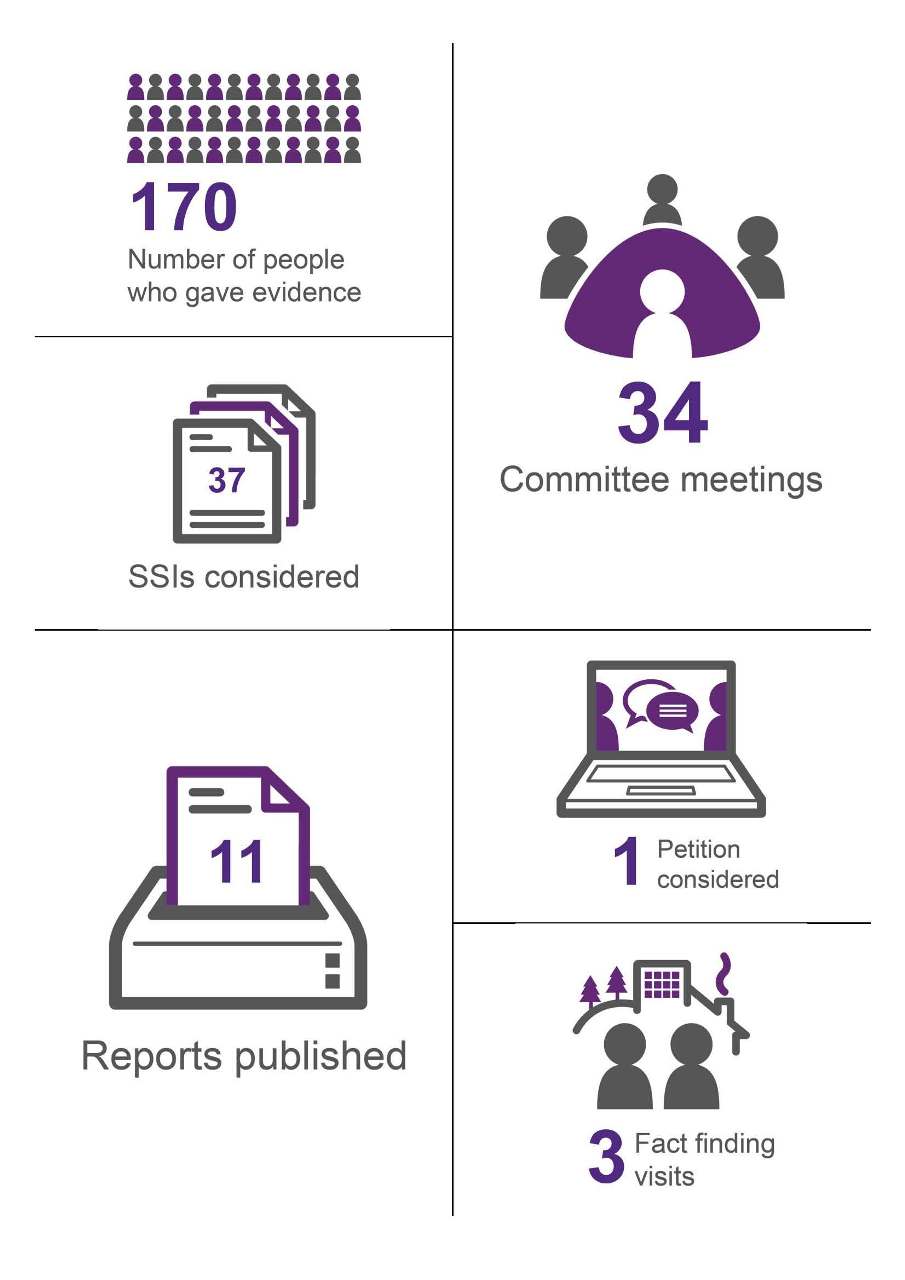
Inquiries and Reports
Report on Homelessness
The Committee undertook a year long inquiry into the causes of, and the long-term solutions to, homelessness in Scotland.
During evidence sessions the Committee heard directly from people who have experienced homelessness, including from care-experienced young people. The Committee also visited charities providing homelessness services throughout Scotland to explore how people access these. Additionally, as part of the inquiry the Committee visited Finland to learn about its approach to tackling homelessness, particularly its use of the Housing First approach. The Housing First model provides a house and a permanent tenancy unconditionally to those who present as homeless and have multiple and complex needs. They are also provided with the right level of support and care to keep them successfully in their tenancy.
Our work would not have been possible without people sharing with us their views, comments and experiences of homelessness - we thank all those who helped us and, in particular, those who courageously shared their stories with us.
The Committee reported on 12 February 2018 and among several other recommendations the Committee recommended that the Scottish Government, in partnership with local government, should implement a Scottish Housing First policy. In its response to the Committee's report the Scottish Government confirmed that it will implement, among several other measures, a Scottish Housing First policy.
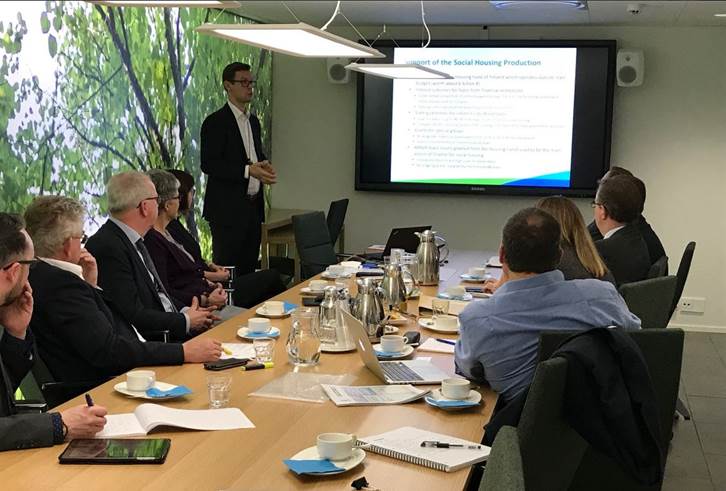
Building Regulations and Fire Safety in Scotland
Continuing its work from February 2017, in early June 2017 the Committee expanded its work on the building standards verification scheme to include consumer rights in relation to building work and take account of the findings in the Report on the Independent Inquiry into the Construction of Edinburgh Schools by Professor John Cole CBE.
In addition to written evidence, the Committee heard oral evidence from the Law Society of Scotland, the Royal Institution of Chartered Surveyors in Scotland, the Institute of Clerks of Works and Construction Inspectorate of Great Britain, and Highland Council.
On 21 June 2017, the Committee widened further the scope of this work to include the fire safety aspect of building regulations following the tragic fire at Grenfell Tower in London. In September 2017, the Committee took evidence on fire safety from key stakeholders concluding with evidence from the Minister for Local Government and Housing on the progress of the recently established Ministerial Working Group on Building and Fire Safety.
The Committee reported its initial views on 30 October 2017, calling for more support for homebuyers in the event of building defects and poor build quality. The Committee also identified a number of improvements that could be made to building regulations and fire safety standards. The Committee welcomed the establishment of the Ministerial Working Group on Building and Fire Safety and will continue to monitor its progress and periodically take evidence from the Scottish Government on the outcomes of the group's planned activities.
In the Scottish Government's response to the report the Minister confirmed that the recommendations would be fully considered recognising that many of the Committee's concerns would be taken forward as part of the work of the Ministerial Working Group. The Parliament debated the Committee's Report on 23 November 2017. During the debate the Minister for Local Government and Housing confirmed the ongoing work of the Ministerial Working Group and agreed with the Committee on the importance of the role of Clerks of Works. The Minister confirmed that he expects this role and the roles of other professionals to be considered by the working group.
City Regions: Deal or No Deal?
The remit of the Committee's inquiry into City Region Deals was “to explore rationale, prioritisation and value for money in relation to city region deals, including the progress to date of city region deals in delivering job creation and economic growth, and the structure and governance of city region deals in Scotland.” The call for views concluded in May 2017 with a total of 39 written submissions received. In addition to this written evidence, the Committee heard oral evidence from a number of witnesses during the inquiry.
The Committee reported its views on 9 January 2018 welcoming the significant investment that City Region Deals bring. The Committee, however, also highlighted some significant issues that need to be addressed including the lack of meaningful engagement with local communities and businesses involved in City Region Deals, greater transparency over which projects are chosen and why, and the unintended negative effect on areas not covered by City Region Deals such as displacement of investment.
In the Scottish Government's response to the report the Minister agreed with many of the Committee's recommendations, especially around closer working with UK Government counterparts. The Minister confirmed that the Scottish Government would consider the Committee's recommendations and also confirmed that the Scottish Government is committed to 100% coverage of Scotland with locally developed and agreed growth deals.
The Parliament debated the Committee's report on 27 March 2018 where Members discussed broadly consensual views on the Committee's findings and recommendations. The Committee intends to keep a "watching brief" on City Region Deals and will review progress again in this parliamentary session. The Committee will also take an interest in the 2019 Gateway Review of the Glasgow and Clyde City Deal as this is the first such evaluation of City Region Deals in Scotland.
On 10 April the UK Government responded to the Committee report recommendations. The UK Government agreed to refer a number of the recommendations such as those relating to equality impact assessments and displacement assessment to the Scottish City Regional Deal Delivery Group for consideration and incorporation within its work.
Scrutiny of Budget 2018-19
On 14 December 2017 the Scottish Government's Draft Budget for 2018/19 was published. This meant that for the second year running the Committee's budget scrutiny process required that evidence from stakeholders be taken before the draft budget was published. The Committee's budget scrutiny focused on a range of aspects including the adequacy of the Local Government budget, council tax, transparency, and the affordable housing supply programme of the Scottish Government's draft budget 2018/19.
In its report the Committee welcomed improvements in transparency but sought further clarity from the Scottish Government on the General Revenue Grant Budget figures and partnership commitments. The Committee also sought information on how public sector pay expectations and GDP influenced budget allocations for local authorities. The Committee welcomed the overall increased funding for housing supply in the Draft Budget 2018/19. The Scottish Government responded to the Committee's report on 18 April providing greater clarity over the figures for the affordable housing supply programme and for adaptations as well as responding to each Committee recommendation.
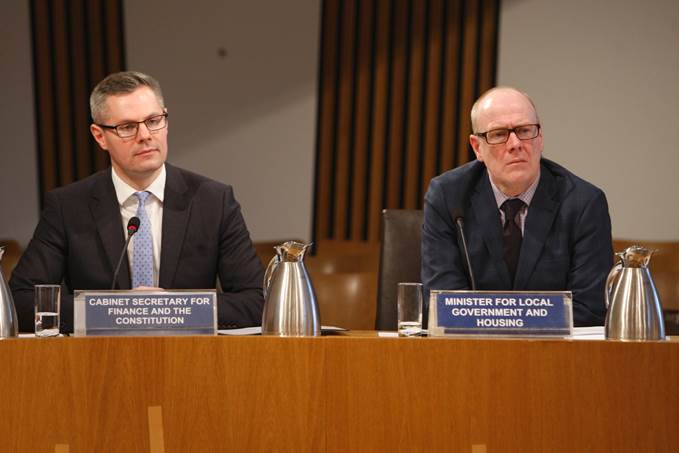
Strategic Housing Investment Plans
During the Committee's work on Strategic Housing Investment Plans (SHIPs) in 2017, the Committee noted that the overview of the SHIPs provided by the Scottish Government had very little information on the delivery of specific types and size of houses required for the local area. On 31 May 2017 the Committee wrote to every local authority requesting further information on their SHIPs and its effectiveness. Twenty eight responses to the call for evidence were received which were then analysed and which highlighted how local authorities were using SHIPs to inform their housing needs. It also highlighted challenges in identifying sites for inclusion within the SHIP at a time when local needs may not have been finalised. This analysis was used to inform the Committee's subsequent scrutiny of the budget for the affordable housing supply programme.
FOI and returning officer payments
In the previous reporting year the Committee undertook a short focussed inquiry into payments to Returning Officers in response to public concern regarding the appropriateness of these payments and how they are spent. The Committee published its report on 24 January 2017 in which it agreed that the current system of payments to Returning Officers is lacking transparency and recommended that the current system should end. In the Scottish Government's response the Minister for Parliamentary Business confirmed that there would be a consultation held on electoral reform in Scotland and that Returning Officer's fees would be looked at as part of the consultation.
Continuing this work in June 2017 the Committee, via the Scottish Parliament's Information Centre, issued a freedom of information request to all local authorities on payments to returning officers for running elections. A range of approaches were adopted by local authorities in providing this information which further endorsed the Committee's concerns regarding the perceived lack of transparency regarding these payments. The Convener wrote to both the Scottish and UK Governments expressing these concerns. In its consultation on Electoral Reform the Scottish Government specifically referenced the Committee's work on returning officer payments seeking responses on the appropriateness of these payments.
Evidence from Public Bodies
During the year the Committee took evidence from a number of public bodies whose work falls within the Committee's remit:
Scottish Housing Regulator;
Scottish Public Services Ombudsman; and
the Commissioner for Ethical Standards in Public Life in Scotland.
The Committee also heard from the Accounts Commission on the findings in its report entitled Local Government in Scotland: Financial overview 2016/17 as part of its Draft Budget 2018/19 scrutiny process.
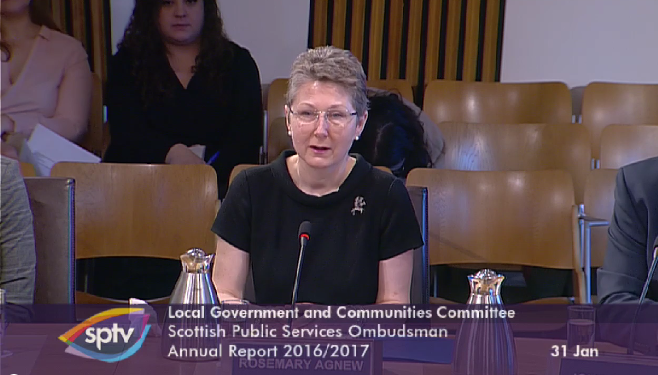
Common Good Properties and Funds
In February 2017 the Local Government and Communities Committee launched a call for written evidence from all interested parties to inform its scrutiny of common good property and funds and received 29 responses. The Committee then took oral evidence from a panel of stakeholders on 20 December 2017.
The Committee heard from stakeholders that whilst work is underway at the Scottish Government to provide for a register of common good other challenges remain.
Following the evidence sessions the Committee wrote to the Scottish Law Commission suggesting that this issue could be included as a topic for inclusion in its Tenth Programme of Law Reform. The Scottish Law Commission responded that in their view there was inadequate support for a project on the law of common good property and funds.
The Barclay Review of Non-Domestic Rates and the Small Business Bonus Scheme
Following the publication of the Barclay Review of non-domestic rates on 22 August 2017 the Committee heard evidence from the Cabinet Secretary for Finance and the Constitution on the Scottish Government's response to the review.
At that meeting the Cabinet Secretary invited the Committee to contribute to its work on evaluating the Small Business Bonus Scheme. The Committee agreed and then held an evidence session with key stakeholders on the range of measures that might form the basis of an evaluation of Small Business Bonus Scheme (SBBS). At that session the Committee was concerned to hear that no evaluation has taken place of the SBBS since its introduction in 2008.
Following the evidence session the Committee wrote to the Cabinet Secretary for Finance and the Constitution welcoming the Scottish Government's forthcoming review of the SBBS but also making a number of recommendation as to how that review should be taken forward. In particular the Committee recommended that the review of SBBS be conducted independent of the Scottish Government and involve stakeholders such as small businesses and Audit Scotland. The Committee also recommended that the outcomes and lessons learned from the SBBS review are applied more widely to other government policies and proposals and that no policy should be implemented without a robust range of evaluation measures of its effectiveness being identified at its outset. The Committee plans to undertake a wider inquiry in the longer term into the purpose of SBBS, its impact and costs.
Scottish Council Elections of 2017
The Electoral Commission's report on the local government election of May 2017 was published on 11 September 2017. Following its publication the Committee requested, and was provided with, additional detailed ward level electoral data and public opinion data. The Committee took evidence from the Electoral Commission on its report at its meeting on 7 February 2018.
Following this session the Committee wrote to the Minister for Parliamentary Business regarding the administration of local government elections and other matters such as the extension of proxy voting due to unforeseen caring responsibilities or to those who have had a bereavement in the family, and candidate regulation. The Committee also requested information on which bodies have a key role on increasing the diversity of the electorate and candidates and; what work is being undertaken to improve monitoring in this area to understand any barriers to improving voter turnout. In response to the Convener's letter the Minister for Parliamentary Business confirmed that he would look again at extending emergency proxy voting and, with the Commission, identify how more information on the diversity of voters might be gathered.The Electoral Commission also wrote to the Committee on issues discussed at the meeting including its work in understanding the barriers to democratic participation amongst those with protected characteristics.
National Outcomes
On 27 March 2017 the Local Government and Communities Committee was designated by the Parliamentary Bureau to lead the Parliament's scrutiny of the Scottish Government's draft revised National Outcomes.
National Outcomes represent the Scottish Government's broad policy aims and are part of the National Performance Framework. Under section 2 of the Community Empowerment (Scotland) Act 2015, the Scottish Government is required to consult the Scottish Parliament on the proposed revisions to the Outcomes.
The Committee sought the views of other relevant committees on the Outcomes that fell within their remit and then reported its views on those three outcomes most relevant to its remit:
We live in communities that are inclusive, empowered, resilient and safe
We tackle poverty by sharing opportunities, wealth and power more equally
We grow up loved, safe and respected, so that we realise our full potential
The Committee reported and published the other Committee views on 15 May.
Future work
The Committee has agreed a programme of future work to take forward later in 2018 and 2019. This includes a one-off roundtable discussion on alcohol licensing in Scotland as well as one on green spaces, and a wider review of the value for money and future of SBBS as well as continued scrutiny of Building Regulations and Fire Safety in Scotland and City Region Deals.
Legislation
Housing (Amendment) (Scotland) Bill
The Housing (Amendment) (Scotland) Bill was introduced on 4 September 2017 with the aim of ensuring that the influence that the Scottish Housing Regulator and local authorities can exercise over Registered Social Landlords (RSLs) is compatible with RSLs being reclassified by the Office for National Statistics as private sector bodies in the United Kingdom national accounts.
The Committee launched a call for views on Friday 8 September 2017 and received 16 written submissions, primarily from local authorities and registered social landlords. In addition to written submissions the Committee also heard oral evidence from stakeholders and from the Minister.
The Committee agreed its Stage 1 report on the general principles of the Bill on 24 January 2017. The report highlighted the Committee's concerns that the removal of consent powers may impact upon previous safeguards and sought confirmation from the Scottish Government on how it would work with the regulator and the social housing sector to ensure that there are no negative impacts as a result of this reclassification. Responding to the Committee the Scottish Government agreed to bring forward an amendment at Stage 2 to limit the duration of the regulation powers provided to Scottish Ministers under Section 8 and 9 of the Bill.
Stage 2 of the Bill took place in Committee on 9 May when the Committee considered and agreed 1 amendment.
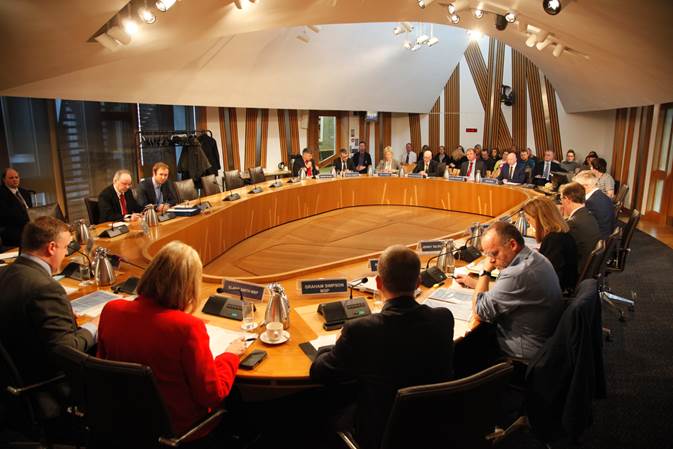
Planning (Scotland) Bill
The Planning (Scotland) Bill was introduced on 4 December 2017. The Bill aims to improve the system of development planning and to give people a greater say in the future of their places and support delivery of planned development.
The Committee agreed its approach to scrutiny of the Bill at Stage 1 at its meeting on 13 December 2017. The Committee recognised that the Planning (Scotland) Bill would attract considerable interest from a wide range of organisations all of whom have a valuable contribution to make to the Committee's scrutiny. The Committee has therefore sought to solicit a range of evidence from organisations and individuals from across Scotland using community events, a conference, online survey and discussion forum as well as seeking written and hearing oral evidence at Committee meetings.
The Committee received 263 responses to its call for views on the Bill as well as 40 substantive written responses on the agent of change principle, principally from music industry bodies and businesses. The Committee also received over 1200 written submissions from individuals asking that the agent of change principle be included in the Scottish Planning Policy, to protect Scotland's music venues. The Committee took oral evidence at its meetings on 28 February 2018 and 7, 14, and 21 March 2018.
The Committee is currently considering its draft Stage 1 report on the Planning (Scotland) Bill.
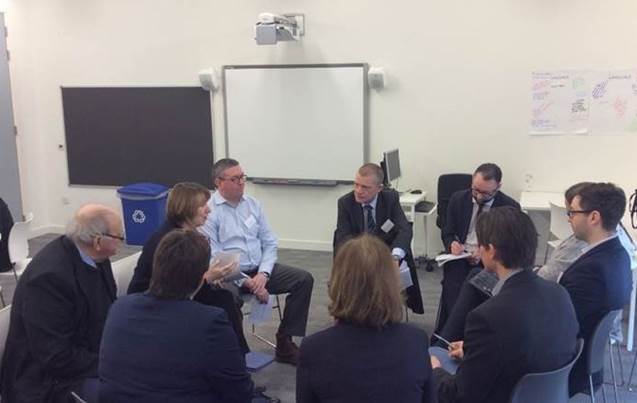
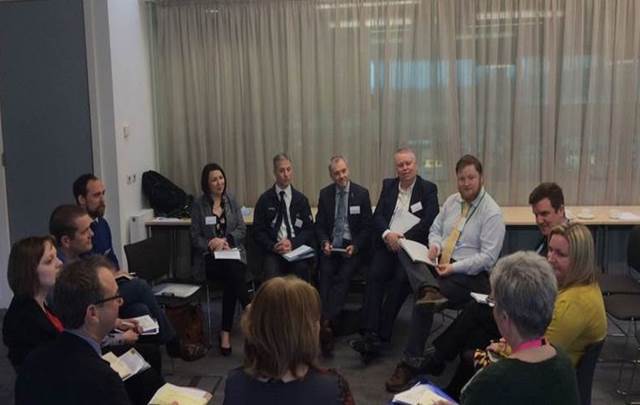
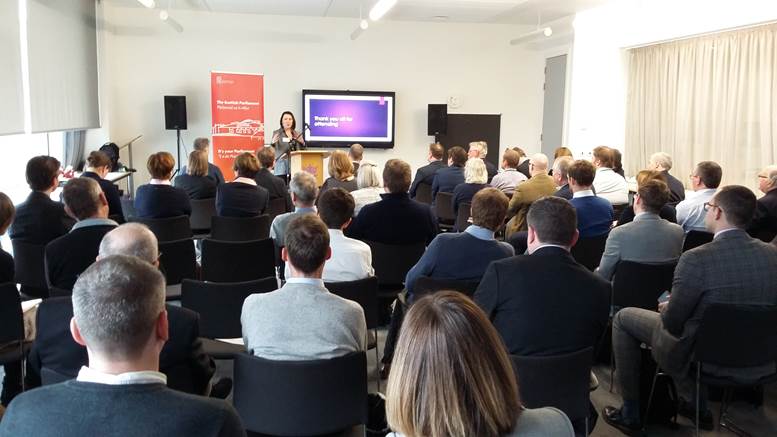
Post-Legislative Scrutiny: Disabled Persons' Parking Places (Scotland) Act 2009
In March 2017, the Committee began post-legislative scrutiny of the Disabled Persons’ Parking Places (Scotland) Act 2009. In May and June 2017 the Committee heard from local authorities, private car park operators, the Member who introduced the Bill, and the Scottish Government. The Committee's report was published on 13 September 2017.
The Committee welcomed the progress made in converting advisory on-street disabled persons' parking places into enforceable places however noted the inconsistent approach to addressing their misuse through enforcement. The Committee also noted that enforcement measures taken by private car park operators do not go far enough and questions were also raised around the capacity of Police Scotland to properly enforce the misuse of disabled persons' parking spaces in areas where parking enforcement has not been decriminalised.
The Committee welcomed the commitment of the Scottish Government in its response to the Committee's report to consider launching a public awareness campaign, to look at alternative enforcement options, and the development of a single Code of Practice for the private car park industry.
Post-Legislative Scrutiny: High Hedges (Scotland) Act 2013
The Committee continued its post-legislative scrutiny of the High Hedges (Scotland) Act 2013. Following on from a call for written views launched in February 2017, the Committee heard from people who had been affected by the legislation, local authorities, from the Member who introduced the Bill and from the Minister. The Committee's report was published on 10 September 2017.
One of the Committee's key recommendations was that the Scottish Government should publish revised guidance setting out how applications should be considered and that the revised guidance should encourage local authorities to be flexible when considering High Hedge applications, while still adhering to their green space strategies.
In the Scottish Government's response the Minister for Local Government and Housing confirmed that the Scottish Government would work with partner organisations to update the current guidance associated with the legislation in light of the Committee's findings. In particular the Government confirmed that it would consult with partner organisations, including COSLA, to develop as clear a definition as possible of what constitutes a hedge.
Subordinate Legislation
During the parliamentary year the Committee considered 37 Scottish Statutory Instruments of which 32 were negative and 5 were affirmative.
Public Petitions
The Committee considered PE1539 which called for Housing Associations to come under the Freedom of Information (Scotland) Act 2002.
Following a Scottish Government consultation the Scottish Government agreed to seek to extend the Freedom of Information (Scotland) Act 2002 to register social landlords. Given this action the Committee agreed to close the petition and to seek written evidence from the petitioner at the time that the relevant secondary legislation is laid in Parliament.
The Committee will soon consider PE01655 which calls on the Scottish Parliament to urge the Scottish Government to review the process for designation of National Scenic Areas (NSAs) and consider increasing the number of NSAs in Scotland to protect the natural landscape and support the tourism sector.
Engagement and Innovation
During its inquiries the Committee has endeavoured to engage directly, where possible, with communities across Scotland as demonstrated throughout this report.
Homelessness
Building on the engagement work undertaken early in 2017 as part of the Committee's inquiry into homelessness, on 20 September 2017 the Committee held a moving and very informative round table discussion with 6 participants who had lived experience of homelessness.
The session was streamed live on Facebook and an Instagram story was developed which followed the journey of 2 of the participants to the meeting at the Parliament as well as behind the scenes of the meeting itself. The Facebook post reached just under 5,400 people and the video was viewed by over 2,158 people.
The participants’ feedback after the meeting was that they felt empowered and listened to. They also said they found the experience less intimidating than they had feared, and commented positively on how supported they had felt throughout. The outcome for the Committee was valuable first hand evidence on the impact of homelessness presented by witnesses who were confident and comfortable with taking part in the process.
This work continued with further evidence sessions and a fact finding visit to Finland to explore the Housing First approach to address homelessness.
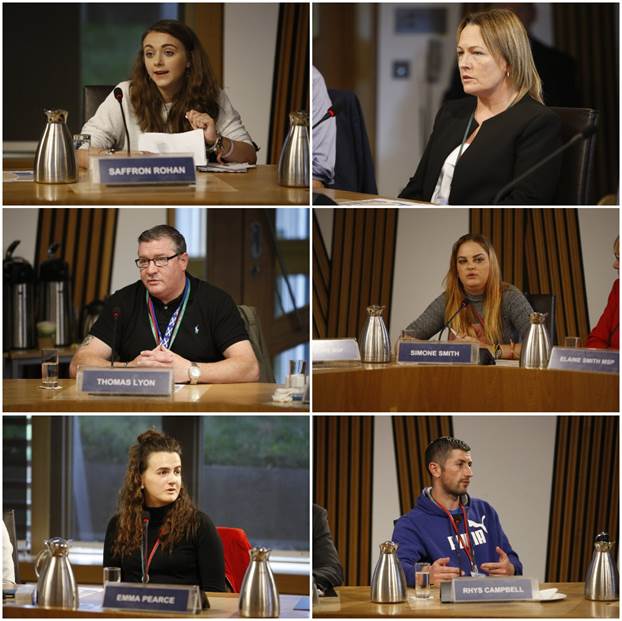
Planning (Scotland) Bill
As part of the Committee's scrutiny of the of the Planning (Scotland) Bill the Committee held several engagement events in different parts of Scotland to give individuals and organisations an opportunity to express their views on the Bill. The Committee held events in Skye, Stonehaven, and Motherwell to meet with community councils and groups. Committee members met with the Linlithgow Planning Forum and West Lothian Council officers to discuss local place planning. The Committee also held a planning conference in Stirling with 43 different public and private sector stakeholders to discuss their views of the Bill.
The Committee also conducted an online survey specifically aimed at young people aged between 12 and 25 to gather their views on the Bill. The Scottish Youth Parliament and YouthLink Scotland supported the development of this survey and then promoted it to their members. Committee members also met with students from Galashiels Academy to discuss planning in their community.
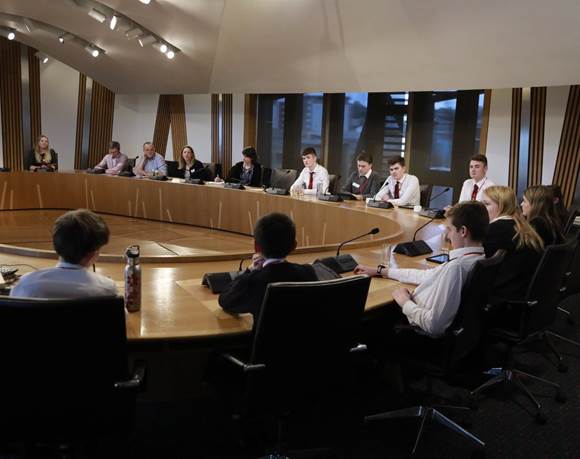
In addition to the engagement events and online survey the Committee also piloted Dialogue, an online discussion forum, for the public to provide their views. This facility allowed people to post comments and ideas and to rate and comment on the views and ideas of others.
Summaries of all the discussions held at these engagement activities were then published and this evidence, the online survey and discussion were used to inform the Committee's scrutiny of the Bill. The Committee will publish its Stage 1 Report on the Planning (Scotland) Bill on 17 May 2018.
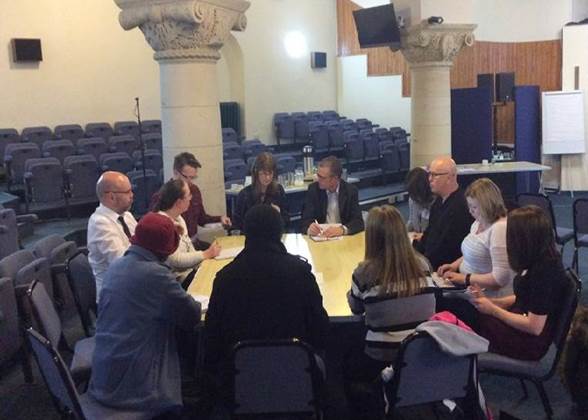
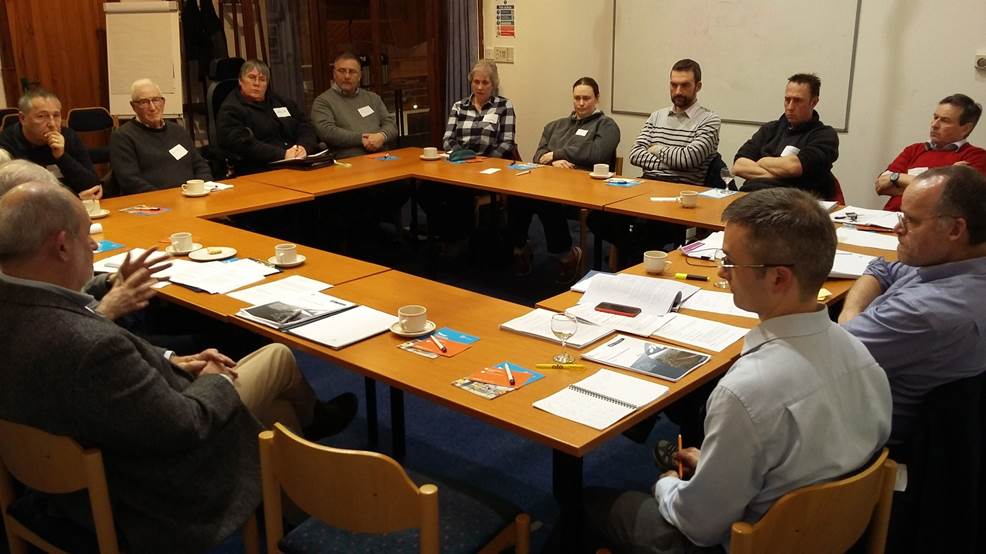
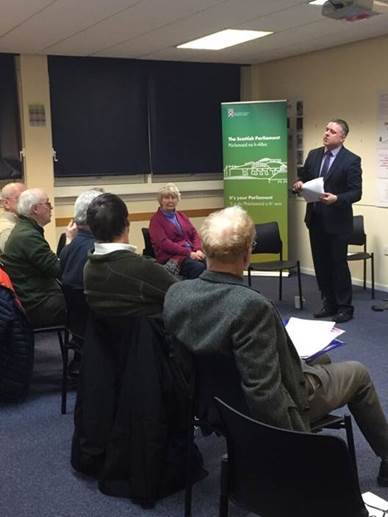
City Region Deals
During the inquiry into City Region Deals members undertook a visit to Glasgow Airport to learn more about the projects within the Glasgow City Region Deal that affect the airport and surrounding areas. This was followed by a discussion with local stakeholders in Paisley on the types of public engagement had taken place on the Glasgow City Region Deal and what involvement they would wish to have with the City Region Deal process.
The views expressed during the visit informed the Committee's scrutiny of the UK and Scottish Government Ministers who attended a joint evidence session with the Committee.
